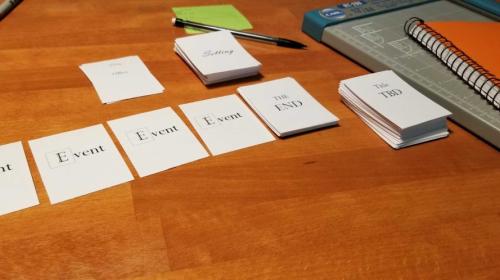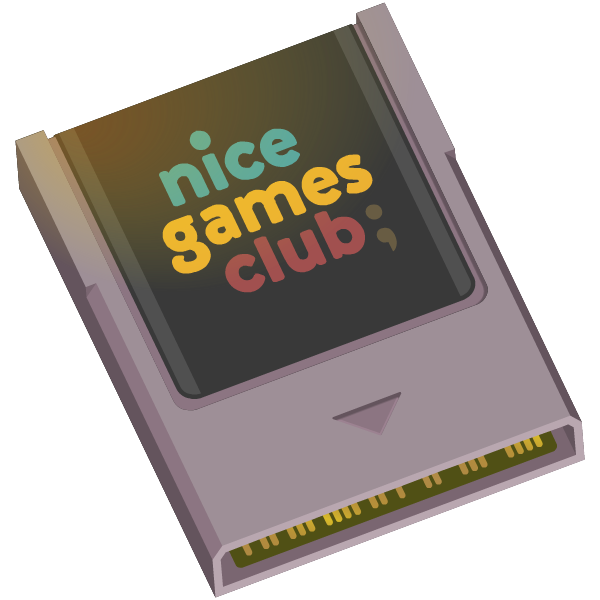
First, some news...
IT'S OFFICIAL: Widget Satchel is coming out on November 27th, 2019!
Until then, you can pre-purchase the game on the Nintendo eShop, and wishlist it on Steam!
This week, our boyfriend Dylan gave your nice hosts a prompt to create "a narrative game where the story is told backwards." This one is a slow burn, but it really cooks by the end!
With Stephen still away, Dale LaCroix (she of Evil Games Club and your nice social media manager) re-enters in the clubhouse to help create this week's game.
But Dale didn't just join your nice hosts for this week's jam. She also took the resulting game and made improvements once the recording stopped! Not only that, but she's going to keep working on it. It will be at Glitch's December Play/Test event if you want to play the latest version!
Our original rules are presented below, and Dale's "first revised edition" is presented below that...
END CARDS: 7 possible endings to your story
SETTING CARDS: Places the story could take place
PLOT CARDS: Events that might take place in your story
MAIN DECK: This is made up of several different types of cards:
Character Cards - Describes the occupation or description of people who will be in your story
Noun Cards - Describes items that will be in your story
Editor Notes - Special instructions from your editor, this might include directions such as this next scene takes place in a different setting, or that someone in your story is not who you think they are.
Deal the following:
- One ‘Setting’ card. Deal face up and place it on top of the Setting deck.
- Three 'Main Deck' Cards. Deal face up. These will be the Goal Cards; if there are any Editor Note cards, place these at the bottom of the main deck and re-deal so that there are three total Main Deck cards representing the Goal Cards.
- One ‘The End’ card. Deal face up and place this on top of the Setting deck.
- Four ‘Plot’ Cards. Deal face down. One will be revealed each round during rounds 2-5.
ORIGINAL Rules
STEP ONE: Start with the END Scenario
We randomly selected by rolling a six-sided die, for the six END SCENARIOS:
- Death
- Getting off a plane
- A big hug / reunion
- The end of a wedding
- Getting on a plane
- Falling off a cliff
Also pick a character card from the deck - draw and discard until you get one - or roll a 20 sided die and table in step 2
STEP TWO: Each Player picks a “card” and adds a detail about the card information that they picked.
The FIRST ROUND will be picked from a separate pile of END SCENARIO DETAILS:
- Wine stain
- Explosion
- Sight bruise to the upper arm
- Knife
- Spilled Milk
- Bloody nose
- Broken Sunglasses
- Frostbite
- Somebody is wearing sweatpants
- An orange
To mimic a card draw this use the following table:
(Roll a 6-sided die, then a 20-sided die)
- A participant
- Shopkeeper
- Cleric
- Magician
- Bride
- Captain
- Peasant/Passenger/Guest
- Bartender
- Detective
- Chef
- Child
- (for 11-20, duplicate 1-10)
- A setting
- Forest
- Mall/ Market
- Tavern
- School
- Meadow
- Ship
- Bridge
- Office
- Home
- Castle
- (for 11-20, duplicate 1-10)
- An action or event
- Robbery
- Fight
- Crash
- Bees!
- Heart Attack
- Lunchtime
- Childish Insult
- Ankle Sprain
- Caught in Traffic
- Overslept or Fall Asleep
- (for 11-20, duplicate 1-10)
- An item
- Pen
- Cable
- Knife
- Oven
- Communication Device (Letter, Phone)
- Mushroom
- Boot
- Cat
- Book
- Sock
- Flute
- Arrow
- (for 13 - 20, more cats, I guess?)
- ROLL AGAIN
- A participant (use list from 1)
STEP THREE: Together the group makes up a story about how each item goes together in this scene to lead up to the established story
STEP FOUR: Repeat for each previous “scene”. Each Scene will take place at some earlier point in time, it may be minutes, hours, days or months earlier. You decide what fits your story best.
STEP FIVE: The fifth round is your inciting incident, the event that kicked off your story.
SCORING: We haven’t figured this out, we discussed awarding points based on if random events happened during the story, such as:
Scoring Events:
- Bloody Nose
- Weather Event
- Somebody Tripped
- Somebody got dumped
- Somebody cries
- The Devil shows up
- Someone left to go to the bathroom
- There was kissing
Or awarding points with a judge or game master….
UPDATED Rules by Dale
"Re-ravel: A backwards storytelling game" (working title)
Introduction
Have you ever heard the phrase, a camel is a horse designed by a committee? It’s a proverb about the faults of having too many designers in a room, causing a final poor design. The goal to this game is to write a story with your friends, but to protect against the story trailing off, like so many comedy sketches, your editor came up with the perfect ending, start with the ending! And it turns out there are only so many endings in human playbook.
Each Game is made out of 5 Rounds or Acts, each moving backward in time.
Three cards from the main deck are selected as goal cards. These can be used in your story at any time. Using each card is worth 1 million points for the team. If an editor note card selected as a goal card, this should be discarded to the bottom of the main deck.
The last round, representing the first part of your story, will be the inciting incident.
Goal
Create a coherent story while using each of the three elements from the goal cards with your writing committee
Round 1: The End Round
Each Player draws a card. For this round only, if you get a Editor’s note, redraw
One at a time. each player reveals their card, and creates one detail or fact about the item or character that they drew, and places the card near the ‘End Card.’ This fact should not relate to anything already placed on the board. The order of players does not matter
Examples:
- Character Card - the Cleric - the cleric has a fancy hat
- Item Card - Wine Stain - the wine stain is on somebody’s white shirt
- Item Card - An Orange - The orange is part of basket of fake fruit
Together the players craft a scene in which all the elements are used, and results in the ending within the setting. At any time the players may pull in the elements on the goal cards
Rounds 2-4: The Middle Rounds
- Each Player draws a card.
- Each player reveals their card
- Adds a detail about their card (as in round one) unless it is a ‘Editor’s Note’ Card
- Places the card near the next face down Plot Card
- If a Editor’s Note Card is drawn, follow the directions on the card.
- When all the elements of the story, the Plot Card is then revealed.
The players then craft the scene. They must use all the elements that were revealed this round. They may use any elements that were revealed in the previous round (i.e. later in the story). They may use any of the elements from the goal cards at any time. The scene should connect and make story-scene with the other scenes that have been crafted.
Round 5: The Final Round, i.e. the beginning of the Story
- Each Player draws a card.
- Each player reveals their card
- Adds a detail about their card (as in round one) unless it is a ‘Editor’s Note’ Card
- Places the card near the next face down Plot Card
- If a Editor’s Note Card is drawn, follow the directions on the card - Unless it is a Epilogue card or other card that places this out of order - please redraw
- When all the elements of the story, the Plot Card is then revealed.
The players craft the first scene. They must use all the elements that were revealed this round. They may use any elements that were revealed in the previous round (ie later in the story). They may use any elements of the goal cards at any time. The scene should connect and make story-scene with the other scenes that have been crafted AND this should somehow start the story (the inciting incident) - How does this plot point kick off the rest of the story.
END of GAME:
Optional: Retell the story in the forwards direction
Award your Committee the following points:
- 1 million points for each goal element used in the story
- 100 points if your story made any sense.
- 500 bonus points if you had a really difficult element you had to fit into your story.


